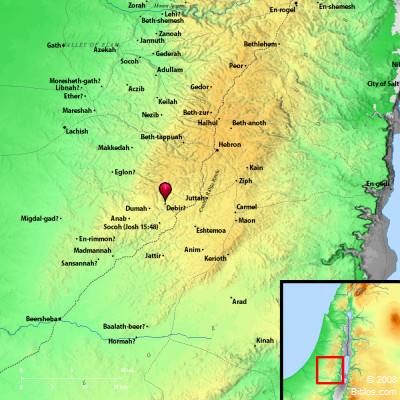Atlas  Debir and surrounding region
Maps Created using Biblemapper 3.0Additional data from OpenBible.infoOccurrences Joshua 10:38 Joshua returned, and all Israel with him, to Debir, and fought against it. Joshua 10:39 He took it, with its king and all its cities. They struck them with the edge of the sword, and utterly destroyed all the souls who were in it. He left none remaining. As he had done to Hebron, so he did to Debir, and to its king; as he had done also to Libnah, and to its king. Joshua 11:21 Joshua came at that time, and cut off the Anakim from the hill country, from Hebron, from Debir, from Anab, and from all the hill country of Judah, and from all the hill country of Israel: Joshua utterly destroyed them with their cities. Joshua 12:13 the king of Debir, one; the king of Geder, one; Joshua 15:15 He went up against the inhabitants of Debir: now the name of Debir before was Kiriath Sepher. Joshua 15:49 Dannah, Kiriath Sannah (which is Debir), Joshua 21:15 Holon with its suburbs, Debir with its suburbs, Judges 1:11 From there he went against the inhabitants of Debir. (Now the name of Debir before was Kiriath Sepher.) 1 Chronicles 6:58 and Hilen with its suburbs, Debir with its suburbs, Encyclopedia DEBIR (2)de'-ber (debhir; Dabeir): "And Joshua returned, and all Israel with him, to Debir, and fought against it: and he took it, and the king thereof, and all the cities thereof; and they smote them with the edge of the sword. he left none remaining" (Joshua 10:38, 39). In Joshua 15:15-17 and Judges 1:11-13 is an account of how Othniel captured Debir, which "beforetime was Kiriath-sepher," and won thereby the hand of Achsah, Caleb's daughter. In Joshua 15:49 Debir is called Kiriath-sannah. It had once been inhabited by the Anakim (Joshua 11:21). It was a Levitical city (Joshua 21:15 1 Chronicles 6:58).
1. The Meaning of the Name:
(1) Debir is usually accepted as meaning "back," but this is doubtful; the word debhir is used to denote the "holy of holies" (1 Kings 6:5). According to Sayce (HDB), "the city must have been a sacred one with a well-known temple." Kiriath-sepher is translated "town of books," and Sayce and others consider that in all probability there was a great storehouse of clay tablets here; perhaps the name may have been qiryath copher, "town of scribes." Kiriath-sannah (Joshua 15:49) is probably a corruption of Kiriath-sepher; the Septuagint has here as in references to the latter polis grammaton, "town of books."
2. The Site:
Unfortunately this site, important even if the speculations about the books are doubtful, is still a matter of uncertainty. Edh-Dhaheriyeh, some 11 miles Southwest of Hebron, has a good deal of support. It was unquestionably a site of importance in ancient times as the meeting-place of several roads; it is in the Negeb (compare Judges 1:15), in the neighborhood of the probable site of Anab (Joshua 11:21; Joshua 15:50); it is a dry site, but there are "upper" and "lower" springs about 6 1/2 miles to the North. A more thorough examination of the site than has as yet been undertaken might produce added proofs in favor of this identification. No other suggestion has any great probability. See PEF, III, 402; PEFS, 1875.
(2) Debir, on the border between Judah and Benjamin (Joshua 15:7), must have been somewhere East of Jerusalem not far from the modern Jericho road. Thoghgret edition Debr, "the pass of the rear," half a mile Southwest of the Tal`at edition Dumm (see ADUMMIM), close to the so-called, "Inn of the Good Samaritan," may be an echo of the name which has lingered in the neighborhood. Many authorities consider that there is no place-name in this reference at all, the text being corrupt.
(3) Debir the Revised Version, margin, Lidebir (Joshua 13:26), a town on the border of Gad, near Mahanaim; Ibdar, South of the Yarmuk has been suggested. May be identical with Lo-debar (2 Samuel 9:4).
E. W. G. Masterman |




